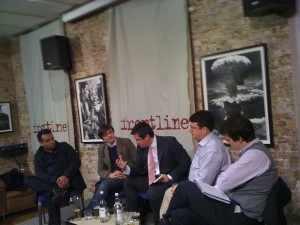Journalism students were told that they needed to be “persistent nosey gossips” by Society of Editors’ executive director Bob Satchwell, at the NCTJ’s student council meeting at Guardian News & Media on Friday.
The annual event brings together students from NCTJ-accredited courses, NCTJ staff and board members as well as working professionals.
Students were given the chance to question the panel of experts, who offered advice on becoming employed.
Managing editor of the Sun, Graham Dudman, said not to submit a CV that is more than one page long.
“You’re not that interesting,” he said, “keep it short and to the point. That is where you are going to score.”
Dudman also claimed that if there are any spelling mistakes in an application it will instantly go in the bin.
Editor of Easyjet magazine, Jeroen Bergmans, echoed Dudman’s comments on spelling mistakes, adding that some even spell his name wrong.
Dave King, editor of the Swindon advertiser advised trainees that the one essential quality is shorthand, stating that “without 100wpm you won’t get a look in”.
Other advice given was to avoid looking lazy by addressing a cover letter with the word ‘sir’ instead of the editor’s name. Brien Beharrell, editorial director, Newbury Weekly News Group warned that if the phrase “I have a passion for writing” appeared, the applicant would not hear back from her.
Beharrell said she would rather see a demonstration that students are writing regularly, whether for a local newspaper or a university magazine.
Dominic Ponsford, editor of Press Gazette, said what impressed him most was someone who was “fantastically enthusiastic”. He suggested writing your CV as if it were a news story itself, with the most eye-catching information at the top. Ponsford also said you need to have “lots of good ideas”.
The meeting included an open discussion about how to improve the NCTJ in which the board showed a preview of its new website to be launched at the end of this month.
The new site is aimed at being more user-friendly and will also include a forum for student discussion and login areas for students and trainees.
Other future changes will also be seen in the transformation of the NCTJ into a multimedia qualification. Chief executive of the NCTJ, Joanna Butcher said: “The debate about what the core skills should be for multimedia journalists will intensify this year.” Citing the group’s annual report, Butcher said a new board will be set up to develop a “multimedia accreditation strategy”, as previously reported by Journalism.co.uk from the Society of Editors conference in 2008.
The reaction from students and trainees to this news was mixed. While many students on the three-year courses supported the idea, others on the short-courses were worried that they would be “spread too thin”, adding that there was not enough time to learn it all.
There is already an option to include a video report in a portfolio and multimedia entries are encouraged on all courses.
Rebecca Hughes, Centre for Journalism, University of Kent. Twitter: @beccihughes.
Read more from Journalism.co.uk on the NCTJ student council meeting at this link

